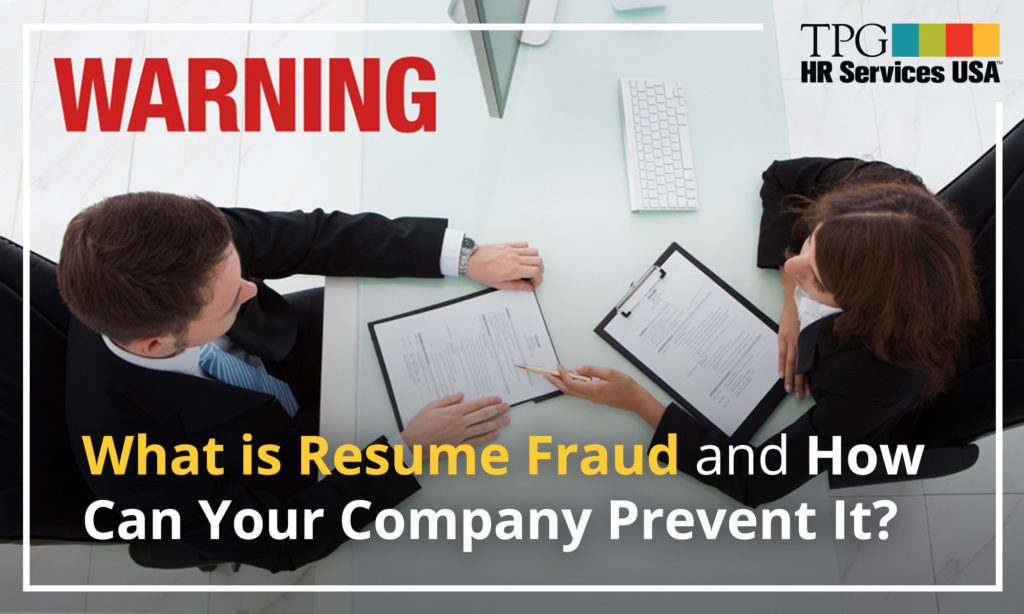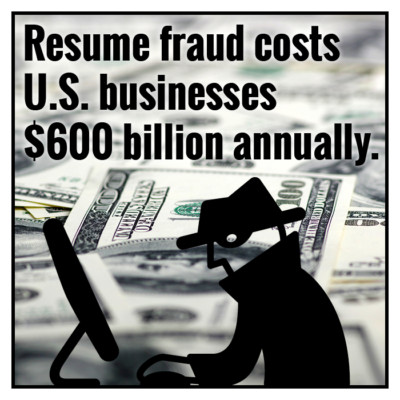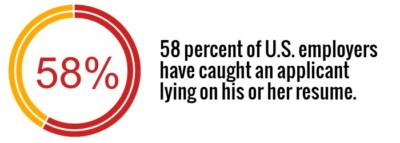
What is Resume Fraud and How Your Company Can Prevent It?

Ms. Pomerantz is the CEO of TPG HR Services USA and has over 35 years of Human Resources practices experience. She holds a Master’s in Human Resource Management (MHRM) and is a certified Senior Professional in Human Resources (SPHR) and SHRM Senior Certified Professional (SHRM-SCP). Mary also serves as CEO of Mary Pomerantz Advertising, one of the largest recruitment advertising agencies in the country. Earlier in her career, she was president of the 17th largest staffing firm in the country.


When employers and recruiters are searching for new talent to help grow their businesses, the résumé is often the only tool to show a candidate’s qualifications. In many cases, interviewers are initially forced to assume that applicants are accurately representing themselves on their résumés. But as we all know, you can’t always take a person’s word as fact. Far too often nowadays job hunters are resorting to resume fraud by embellishing, or completely fabricating information about their work experience and qualifications to improve their chances of being hired.
Depending on the industry, hiring a person based on erroneous résumé information could be devastating. Imagine if your nurse, doctor, lawyer, car mechanic, plumber, or teacher lied about their experience. How would you feel if you paid for a professional and instead received services from someone who was unqualified? If hiring managers and recruiters aren’t diligent in their searches and questioning, this is a very real possibility. In many cases, once the person is hired, months and even years can pass without the resume fraud being detected.

HireRight recently reported the previous 58 percent number has now risen to 86 percent of U.S. employers citing they have caught an applicant lying on his or her résumé. It’s also estimated that résumé fraud costs U.S. businesses $600 billion annually.[1] Résumé fraud can lead to disgruntled customers, an alienated work staff, decreased production, or a costly lawsuit.
Here are some of the Most Common Types of Résumé Lies, according to CareerBuilder:
- Exaggerated Skill Set
- Embellished Responsibilities
- Dates of Employment
- Job Title
- Academic Degree
- Companies Worked for
- Awards
Drawing the Line between Embellishment and Lying

Who among us isn’t guilty of overselling ourselves from time to time? Whether it be on a first date with a person of interest or trying to land that first job out of college, it’s not uncommon for a person to highlight the positives and downplay the negatives. Additionally, sometimes the truth is somewhat subjective and a matter of perspective. Saying that you were an integral part of your IT Department in your last job might be true in your mind, but perhaps not in the minds of the other IT team members. So is this really a lie?
To be clear, a big difference exists between an exaggeration and a fabrication. Saying you were an important part of your department is a lot different than saying you have skills or experience that you don’t. Saying that you graduated from an Ivy League college when you only have a high school diploma is an unacceptable misrepresentation.
A candidate overstating his or her involvement in a work project is one thing; completely making up qualifications and credentials is another. One is objectively provable while the other is based on a person’s perception. Obviously, it would be great if everyone was 100 percent honest, but even employers oversell themselves to potential candidates. As they say, the truth is a triple-edged sword; your truth, their truth, and then the real truth.
How to Be a Lie Detector To Combat Resume Fraud

The extent that job hunters go to in order to puff up, fudge, embellish and/or fabricate their employment qualifications are staggering. The rise of the Internet has created a proliferation of online degrees. Unfortunately, an unintended consequence is how much easier it made it for candidates to lie about their experiences and background. Here are some common tricks used by some dishonest job applicants:
- Filling employment gaps with companies that have closed or never existed
- Using websites to “enhance” your résumé to make it be picked up by automated résumé screening programs
- Listing universities briefly attended, implying that they received a degree from the institution
- Getting online degrees from “diploma mills,” which are online companies that give out college degrees based on “life experiences,” requires very little coursework, if any.
- Paying computer hackers to add their names to college and university alumni databases
Many of these tricks are used based on the assumption that an employer will not do his or her due diligence in background checks and calling references. These applicants assume that hiring managers, recruiters or HR professionals will not want to spend the time and money to ensure resume honesty. This is where you have to prove them wrong. Protect your company from potential lawsuits and loss of clientele by ensuring your employees are being truthful on their résumés.
Here are some tips to help you weed out candidates who are being less than honest:
- Ask for specific dates of employment down to the month. This way, if an employee says they worked for a company from 2014 – 2015, you can be sure they worked for the entire year, not just a few months during each year.
- Ask questions, don’t assume. Find out if they actually graduated from the college they’ve listed. Get details about their actual job duties, including programs they use, challenges faced and common problem-solving strategies they employed.
- Verify accreditations from schools that don’t sound familiar.

- Don’t trust the phone numbers provided by candidates, as multiple diploma mills and false reference generating sites give phone numbers that will verify degrees received and prior employment. Instead, look up the places of employment yourself and ask for extra references during the interview.
- Where applicable, ask for samples of work and for a detailed explanation of the candidate’s involvement. This could help reveal if the applicant actually knows what he or she is doing. If an interviewee shows you a logo they created but doesn’t seem to be familiar with any graphic design software, this could raise a red flag.
- Ask for official school transcripts in a sealed envelope. You may want to take it a step further and have the transcripts sent directly to your place of business.
- Conduct a background check. This is especially important when dealing with positions of trust and/or safety.
Partner with a Trusted HR Provider
A large part of the reason why so many job applicants are willing to lie on their résumés and so many get away with it is that business owners and hiring managers are often strapped for time. It’s difficult enough to run your company and try to promote its growth without adding hours and hours of double and triple-checking employment history, references, and other qualifications.
One of the steps you can take in protecting your company from résumé fraud is to join forces with an outsourced HR provider, like TPG HR Services USA. Our senior staff possesses over 30 years of HR experience and will happily screen your candidates and verify the accuracy of their résumé claims. We’ve led the recruiting efforts of dozens of companies across the United States.
Don’t take any chances with your business, clients, or employees. Allow us to ensure that you’re recruiting the best possible candidates for your open positions. Contact us today at 732-917-6000 to learn more about our many HR services and how we can help your business succeed.
